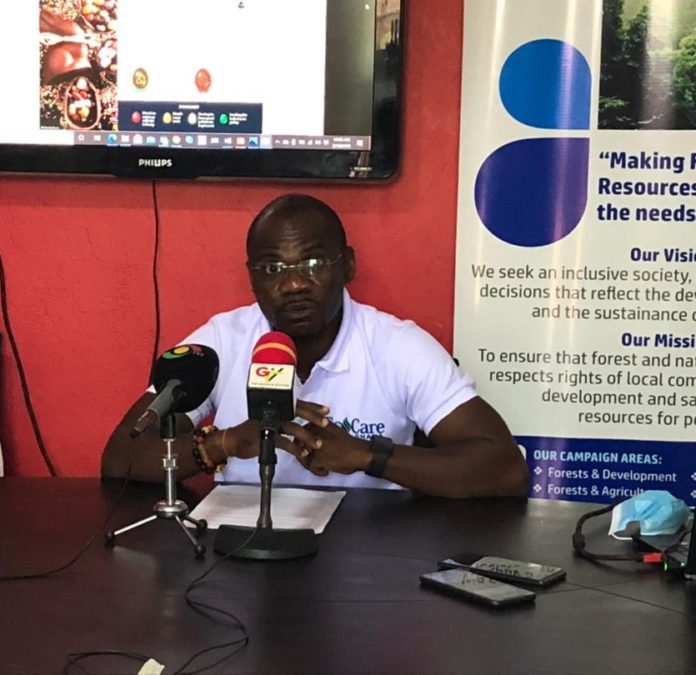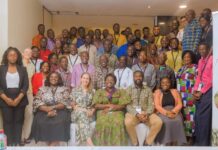Every day, millions of people around the world enjoy chocolate and other products made from cocoa grown in Ghana. Ghana’s cocoa industry is among the world’s best in terms of export volume and innovation said by the CSOs at the launch of the Easter Chocolate Scorecard.
“Ghana is the second-largest cocoa producer in the world; in 2019/2020 season we produced an estimated 800,000 metric tonnes of cocoa beans and hoping to increase it to 850,000 metric tonnes in 2020/2021 season. The issue is that there are concerns about the circumstances under which cocoa is produced.
Cocoa is a major global driver of forest destruction. West Africa produces 75% of the world’s cocoa, with Côte d’Ivoire and Ghana being the largest producers. These two countries have lost most of their forests in the past sixty years around 94% and 80% respectively.
This has prompted several high-level discussions on the future of cocoa production in Ghana and Cote d’Ivoire” Managing campaigner for EcoCare Ghana, Obed Owusu-Addai said at the launch of the 2021 Easter scorecard in Ghana that was earlier launched in Washington D.C, USA.
“The Managing campaigner mentioned that Easter is the biggest chocolate shopping holiday of the year. The 2021 Easter Scorecard ranks and grades chocolate companies on key sustainability issues.
The Easter Scorecard, ranking the performance of global chocolate companies’ reveals they are shortchanging farmers in Ghana and Cote d’Ivoire by not paying them what they deserve.
The latest findings by six international civil society platforms in the cocoa sector have revealed that some chocolate companies are failing to pay the living income differential meant to improve the wellbeing of the farmers in Ghana and Cote d’Ivoire” he said.
Emphasizing the profound shortchanging of cocoa farmers in Ghana and Cote d’Ivoire, Mrs. Sandra Kwabea Sarkwah, SEND GHANA Project Officer said that the key sustainability issues they want to address now are human rights due diligence, transparency and traceability, living income, child labour, deforestation and climate, and agro-forestry.
“I believe there is the need for retooling in the cocoa sector and with a common front we will win the fight against unacceptable living income differential for farmers in Ghana and Cote D Ivoire.
Ghana and Cote D Ivoire managed to get $400 dollars extra money as living income differential for farmers, but, what we found out was that these multinationals are trying to evade the payment of this extra income,” she said.
Senior Advisor at Might Earth, a global environmental campaign organization, Mr. Samuel Mawutor explained that the scorecard also shows that peace for adopting agroforestry and more climate-friendly farming practices is much slower than required.
“The joint survey was developed, completed, and published by Mighty Earth, Green America, INKOTA, National Wildlife Federation, and Be Slavery Free (Australia and The Netherlands).
We created explanatory videos for Zoom conferences with companies to answer any possible questions and graded the companies. Companies were appointed a liaison from the team, and many companies took the opportunity to meet with their liaisons virtually.
The companies selected ranged from the largest cocoa traders and chocolate manufacturers in the industry to smaller innovative companies. Those selected either can take a large toll or make a big positive impact on people and the planet. The survey covered human rights due diligence, transparency and traceability, living income, child labor, deforestation and climate, and agroforestry. These are some of the most pressing, vital sustainability issues facing the chocolate industry today.
Storck, Unilever, Starbucks, and Valrohna were approached to participate but did not do so. Non-participation was viewed as a lack of transparency; we believe that all companies selling chocolate products should be able to provide the information we are asking for, and consumers have the right to know the conditions under which chocolate is produced.
Storck, a confectioner with production facilities in Germany and 12 international subsidiaries received the lowest marks the ‘Rotten Egg Award’ for lack of responsiveness and transparency.
The ‘Good Egg’ was awarded to Alter Eco, a US-based company with distribution in the US and Europe.
Previous Rotten Egg “winners” substantially improved their performance on sustainability across the board.” he explained.
The Media Launch for the Easter Chocolate Scorecard was held at ECOcare Ghana Head office in Accra.








